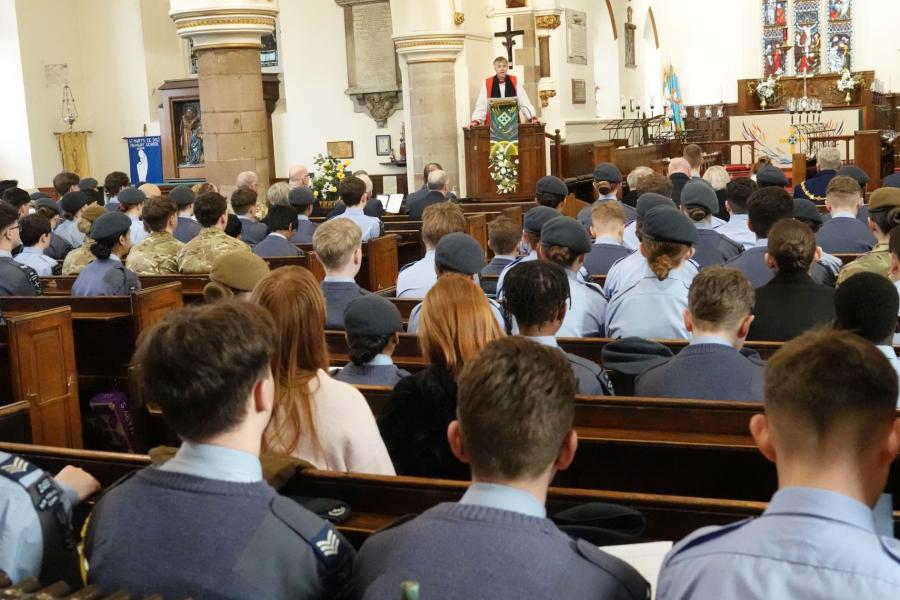 Redditch and Bromsgrove Deanery covers the two towns in the north-east of our diocese, along with a number of villages on the edge of Droitwich and towards Kidderminster and Stourport. The Area Dean is Paul Lawlor, Vicar of St Stephen’s Church in Redditch town centre, and the leadership team also includes Lay Chair, Kashmir Garton, Secretary, Mark Wheatley and Treasurer, Chris Barlow.
Redditch and Bromsgrove Deanery covers the two towns in the north-east of our diocese, along with a number of villages on the edge of Droitwich and towards Kidderminster and Stourport. The Area Dean is Paul Lawlor, Vicar of St Stephen’s Church in Redditch town centre, and the leadership team also includes Lay Chair, Kashmir Garton, Secretary, Mark Wheatley and Treasurer, Chris Barlow.
“All of our leadership team work full-time,” said Kashmir. “Church is also a big part of our lives and we’re able to contribute using the skills from our day jobs. I am faith lead for the Probation Service and it’s a real privilege to be able to combine my faith and work together in this way.”
Chris is an Accountant, bringing significant experience to help with the implementation of Ministry Share, and Mark is a Professor of Biochemistry. He is based in Feckenham, which was previously in the old Droitwich deanery. Mark said: “The fact that we’re all working means that we try to use our time as effectively as possible - our meetings are structured and have a defined time and purpose. We also all get on well, which definitely helps ensure meetings are effective!”
During the first year of the new deaneries, the team has been working with the deanery synod to create a vision statement. Archdeacon Nikki joined the first deanery synod and members discussed possible suggestions for the vision in small groups. The leadership team then took all these away and brought a suggested vision statement back to the next synod.
Paul said: “We came up with the statement: Working and learning collaboratively in mission and ministry to grow as the family of God. At the second deanery synod we asked people if they felt they could sign up to this and whether there was anything missing. We also talked about unpacking it further over the coming months and years. This synod was held in a hybrid format with some people in the room and others on Zoom – including some of the leadership team. We ensured each member of the team was involved in presenting the ideas and in the following discussion. It seemed to work well and we were pleased with the level of engagement. If it enables more people to attend, we’ll definitely be continuing with meetings in different formats in the future.”
The Deanery Leadership Team is also working on linking people across the whole deanery. “One of our challenges is that we are very definitely two towns with two different models of how we can be Church in our areas. We want to embrace these differences and learn from each other through working together.”
One plan is to create support groups for people in different roles. “My work in the Probation Service is built on working collaboratively with different agencies and I’m really keen to embed that idea within the deanery,” said Kashmir. “To start, we’re setting up groups for churchwardens, safeguarding officers and treasurers, where they can talk together, ask questions and raise issues in smaller groups than are organised at a diocesan level. Each group is led by members of the group themselves, but with support and encouragement from the leadership team.”
Alongside plans for the whole deanery, including a Bishop’s Certificate course which is being led by leaders in both Bromsgrove and Redditch and deanery newsletters, the leadership team has been engaging in a specific local conversation for Redditch. This is looking at ways in which the 12 churches in the greater Redditch area can work together through establishing a mission area for the town. Meetings have been held with all the parishes involved as well as some open meetings to ensure that everyone is engaged and can contribute to the ‘Revitalising Redditch’ plans.
“We hope that in the coming years, churches across Redditch and Bromsgrove will be able to flourish in different ways, with more collaboration and learning together,” said Paul.
“We also hope that parishes will see the deanery in a positive light and as a support for them which does more than simply pass information to them from the diocesan office,” said Mark. “We want to make it something that they want to be a part of and which allows parishes to do things that they’re not able to do by themselves.”

